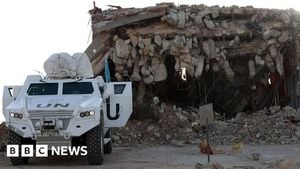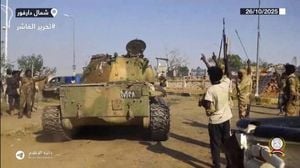On October 27, 2025, Israel’s Foreign Minister Gideon Saar delivered a message that reverberated far beyond the region: Israel will not allow Turkish troops to participate in the US-proposed international force set to oversee the fragile ceasefire in Gaza. This declaration, reported by outlets including Caliber.Az and the Associated Press, comes as global powers scramble to stabilize Gaza after a brutal two-year conflict with Hamas and to prevent a security vacuum as reconstruction efforts begin.
The plan, championed by US President Donald Trump, envisions a multinational stabilization force—about 5,000 strong—tasked with monitoring the ceasefire, training vetted Palestinian police, and supporting the gradual withdrawal of Israeli troops as Hamas militants disarm. While the proposal is ambitious, the list of nations willing and able to contribute troops remains uncertain. However, one thing is now clear: Turkey will not be among them, despite its vocal willingness to help.
“Countries that want or are ready to send armed forces should be at least fair to Israel,” Saar said at a news conference in Budapest, according to Caliber.Az. He didn’t mince words about the rationale behind Israel’s stance. Relations between Israel and Turkey, once warm, have deteriorated sharply during the Gaza war. Turkish President Recep Tayyip Erdoğan has been one of the most outspoken critics of Israel’s air and ground operations, even accusing Israel of genocide—a charge Israel vehemently denies. Erdoğan also compared Israeli Prime Minister Benjamin Netanyahu to Adolf Hitler, further stoking diplomatic tensions.
“Türkiye, led by Erdoğan, led a hostile approach against Israel,” Saar continued. “So it is not reasonable for us to let their armed forces enter the Gaza Strip, and we will not agree to that, and we said it to our American friends.” This sentiment was echoed at the highest levels of Israeli government. Just a day before Saar’s comments, Netanyahu stated, “Israel will determine which forces are unacceptable to us. This is, of course, acceptable to the United States as well, as its most senior representatives have expressed in recent days.”
Washington, for its part, has made clear that US troops will not be deployed in Gaza. Still, the US has been deeply involved in brokering the ceasefire and is actively seeking contributions from other nations. According to the Associated Press, around 200 US troops are currently in Israel, working alongside Israeli forces and other international delegations at a coordination center, planning Gaza’s stabilization and reconstruction. The US has reached out to Indonesia, the United Arab Emirates, Egypt, Qatar, Turkey, and Azerbaijan to discuss potential contributions to the force, but Israel’s veto over Turkey’s involvement has now set a firm boundary.
US Secretary of State Marco Rubio, speaking during a recent visit to Israel, underscored that Israel’s approval of participating nations is a key condition for the multinational force. “The international force would need to comprise ‘countries that Israel’s comfortable with,’” Rubio said, sidestepping direct mention of Turkey but leaving little doubt about the US position.
Turkey, meanwhile, has not hidden its eagerness to play a role. At a summit in Egypt just two weeks ago, Erdoğan was among four leaders to sign a document outlining Trump’s vision for Gaza and regional peace. Turkish officials signaled readiness to provide “all kinds of support to Gaza,” including peacekeeping or humanitarian assistance. Turkey also maintains close ties with Hamas, which complicates matters further. While Israel accuses Turkey of allowing Hamas to plan attacks and carry out recruitment and fundraising from its territory—a charge Turkey denies—Ankara does not consider Hamas a terrorist organization, instead framing its relationship as part of broader support for the Palestinian people.
As the ceasefire agreement’s first phase unfolds, the region is witnessing a somber exchange of bodies. Since the truce began on October 10, the remains of 16 hostages have been returned to Israel, while 12 bodies are still to be recovered in Gaza. In exchange, Israel has handed back 195 Palestinian bodies, fewer than half of which have been identified. On October 27, 41 unidentified bodies were buried in Deir al-Balah, Gaza, and a funeral was held in Israel for slain hostage Yossi Sharabi, whose remains were returned earlier in the month. Egypt has deployed experts and heavy equipment to Gaza to assist in the search for the remaining hostages’ bodies, with efforts continuing in the city of Khan Younis.
The ceasefire, brokered by President Trump, is fragile. It calls for Israeli troops to gradually withdraw from more areas of Gaza as the international force “establishes control and stability” and as Hamas militants disarm. But the specifics of the stabilization force’s mandate are still being hammered out. Some Arab and Muslim nations are wary of the mission’s scope. As King Abdullah II of Jordan told the BBC, “What is the mandate of security forces inside of Gaza? And we hope that it is peacekeeping, because if it’s peace enforcing, nobody will want to touch that.”
The US is working to secure a UN mandate or other form of international authorization for the force, according to Secretary Rubio. Vice President JD Vance, who visited Israel last week, said multiple countries had expressed interest in joining the force, though the composition remains unsettled. The first phase of the ceasefire also included the release of the last 20 living hostages held by Hamas, with Israel in turn freeing roughly 2,000 Palestinian prisoners—most of whom had been seized in Gaza during the war and held without charge, alongside 250 Palestinians sentenced to prison terms, many for deadly attacks on Israelis dating back decades.
The question of who will ultimately make up the stabilization force is more than just a diplomatic chess game. For Israel, the prospect of Turkish troops—seen by many officials as proxies for Erdoğan’s combative stance—was simply a bridge too far. For Turkey, exclusion from the force is a blow to its ambitions as a regional power and a supporter of the Palestinian cause. For the US and its allies, balancing Israeli security concerns with the need for broad international legitimacy is a delicate act.
As the ceasefire holds, at least for now, and the work of reconstruction and reconciliation begins, the question of who will keep the peace in Gaza remains unresolved. But one thing is certain: the stabilization force, if and when it materializes, will not include Turkish boots on the ground.




